STLCC Automotive Students Excel in Great Race Competition
April 02, 2025
Posted by School of Advanced Manufacturing, Industrial Occupations and Transportation in Programs and Pathways
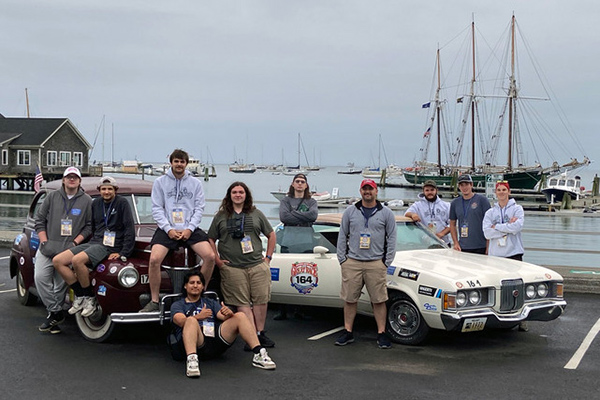
After months of meticulously preparing their cars for a grueling 2,000-mile race, 11 automotive technology students from St. Louis Community College hit the road, embarking on an unforgettable journey through 13 states. Their hard work and determination paid off as they proudly secured top 10 finishes in their respective divisions in the prestigious Great Race competition.
What is the Great Race Competition?
The Great Race is more than just a test of speed; it’s a unique, cross-country vintage car rally that pushes participants’ precision, endurance and driving skills. Unlike traditional races, this rally emphasizes the importance of accuracy in following a detailed set of instructions rather than just reaching the finish line first. Participants must navigate through various terrains, from bustling city streets to quiet countryside roads, adhering to the rally’s strict guidelines.
Each car must follow a prescribed route, maintaining specific speeds as outlined in the instructions. Any time lost during turns, stops or detours needs to be strategically made up, demanding a high level of skill and concentration from the drivers and their navigators. To add to the challenge, modern navigational aids such as GPS, smartphones, maps and computers are strictly prohibited. Even odometers are covered, pushing the teams to rely solely on their wits, mechanical skills and the stopwatch in the navigator’s hand.
The rally is as much about precision as it is about the love for classic cars. Historic vehicles, many of which have been meticulously restored by their owners or participants, take center stage, offering a nostalgic glimpse into automotive history. The scenic routes chosen for the rally often highlight some of the most beautiful and historically significant landscapes in the United States, blending competition with exploration and discovery.
Restoring Classic Cars for the Race
The STLCC automotive technology students took on the ambitious task of restoring two vintage cars that would be their chariots in the Great Race: a 1941 Ford Super Deluxe and a 1972 Mercury Cougar. When these cars arrived at the STLCC-Forest Park campus earlier this year, they were far from road-ready. The vehicles were in rough shape, requiring extensive restoration work to be fit for the demands of the 2,000-mile rally.
The restoration process was a labor of love, combining the students' growing technical expertise with their passion for automotive history. Under the guidance of their instructors, the students meticulously worked on every aspect of the vehicles. They rebuilt engines, repaired transmissions, replaced worn-out parts and ensured that the brakes, tires and other critical systems were in top condition. This hands-on experience not only prepared the cars for the race but also provided the students with invaluable practical skills that would serve them well in their future careers.
When race day arrived, the students’ hard work paid off. The Mercury Cougar team achieved an impressive fifth-place finish in its division, while the Ford Super Deluxe team secured seventh place in their division. Overall, the Cougar placed 71st, and the Deluxe came in 99th out of a field of over 120 vehicles that participated in the race, which took place from June 22-29.
An Unforgettable Experience
For the students, the Great Race was much more than just a competition; it was a once-in-a-lifetime experience that allowed them to bond, learn, and grow both as individuals and as a team. Josh Walker, an associate professor of diesel technology at STLCC who advised the group, reflected on the journey, saying, “The Great Race was an amazing experience for these 11 students. This team was a mixture of many different backgrounds – night and day school, first and second year – and it has been incredible to watch them bond together to keep these cars running across America.”
Walker’s words highlight the sense of camaraderie that developed among the students as they worked together to overcome the many obstacles they faced along the way. “These students got to visit many states they had never seen, developed new friendships, and created memories they will never forget. STLCC is currently the only school in the St. Louis area competing in the race, and seeing our students represent their school and city so well was the highlight of the trip.”
Automotive Technology Students Earn Scholarships
In addition to their impressive performance in the race, several of the automotive students were recognized with scholarships that will help them continue their education. The RPM Foundation, an organization dedicated to supporting the next generation of automotive restoration and preservation professionals, awarded $2,000 scholarships to three students and $1,000 scholarships to five others.
For many of the students, the scholarships were a testament to the hard work and passion they had poured into the restoration project and the race itself.
“It definitely brought us all together. We all had a good time. It wasn’t like we were complete strangers; we knew of each other, but it brought us all together because we had a common interest and goal,” said Micah Holst, a first-year student in the automotive technology program.
"It was a lot of fun, a lot of great times, a lot of great memories.”
Holst’s words echo the sentiments of many who participate in the Great Race—it’s not just about the competition, it’s about the journey, the friendships formed and the shared love for classic cars and the open road.
Alongside Holst, the other students who participated in the Great Race include:
- Nathan Depelheuer
- Matt Kalb
- Kyle Kannawurf
- Taron Greenlee
- Matthaeus Riegerix
- Christian MacZura
- Evan Welch
- Alexis Martinez
- Finn Zimmerman
- Will Vankirk
How to Prepare a Car for a Long-Distance Trip
Preparing a car for a long-distance trip, especially one as demanding as the Great Race, requires careful planning and attention to detail. The students at STLCC undertook a comprehensive checklist to ensure their vehicles were ready to face the challenges of the rally:
- Comprehensive Inspection: The students performed thorough inspections of the key systems in the cars, including the engine, transmission, brakes and tires. Each component was carefully examined to ensure it was in good working order, and any issues were addressed before the cars hit the road.
- Fluids Check and Replacement: The team topped up and checked all essential fluids, such as oil, coolant, brake fluid and transmission fluid. Maintaining proper fluid levels was crucial for the vehicles’ performance and longevity during the race.
- Part Replacement: Any worn-out or damaged parts were replaced to prevent potential breakdowns during the race. This included replacing belts, hoses, spark plugs and other critical components that could fail under the strain of long-distance driving.
- Performance Testing: Before embarking on their journey, the students tested the vehicles’ performance under various conditions, simulating the circumstances they might face during the race. This allowed them to identify and address any last-minute issues, ensuring the cars were as race ready as possible.
Navigating the Great Race Course
One of the most challenging aspects of the Great Race is the navigation. Each day, the driver and navigator team receive detailed instructions outlining every turn, speed change, stop and start they need to make. On average, they receive between 220 and 250 instructions per day, requiring precise execution to avoid penalties.
At various points along the route, there are four to seven checkpoints where the exact time each team passes is recorded. The goal is to arrive at each checkpoint at the designated time, with any deviation resulting in penalty points. This system rewards teams that can maintain consistent accuracy and precision throughout the race.
The level of concentration and coordination required between the driver and navigator is immense. Without the aid of modern technology, the students relied on their mechanical knowledge, quick reflexes and the stopwatch to guide them through each leg of the race. This experience honed their skills in ways that traditional classroom learning cannot replicate, providing them with real-world experience in problem-solving and teamwork under pressure.
The Race Journey: From Owensboro to Gardiner
The Great Race is as much about the journey as it is about the competition. For the STLCC students, this journey began in Owensboro, Ky., and ended in Gardiner, Maine, covering a scenic route that took them through historic towns, busy cities and picturesque landscapes.
One of the highlights of the race was the opportunity to visit some of the country’s most iconic landmarks along the way. The students marveled at the historical significance of the Gettysburg Battlefield, soaked in the energy of New York City and were awestruck by the natural beauty of Niagara Falls. Each stop along the route offered a unique experience, adding to the sense of adventure that defined the race.
However, the race was not without its difficulties. Maintaining the rebuilt cars in good working condition throughout the journey required constant vigilance and quick thinking. In fact, 30 of the cars that started the race failed to finish, a testament to the rigor of the course and the demands placed on the vehicles and their teams.
The STLCC students faced their own share of challenges, particularly with the Ford Super Deluxe. Just after crossing the finish line, the car stalled out in front of the crowd, forcing the Cougar team to push it down the street to park.
“After crossing the finish line, I mean literally just after the finish line, our car stalled out right in front of everyone,” Holst said. “So, the Cougar team had to push us all the way down the street to park.”
Despite these obstacles, the students’ perseverance and teamwork ensured they completed the race, earning respect and admiration from their peers and spectators alike. The Cougar team ultimately finished fifth in its division and the Deluxe took seventh, or 71st and 99th overall respectively.
Revving Up for the Future
For the STLCC automotive technology students, participating in the Great Race was a defining moment in their educational journey. It was a chance to apply their classroom knowledge to real-world scenarios, to learn from hands-on experience and to bond with their peers over a shared passion for classic cars and racing.
The Great Race also highlights the unique opportunities available to students at STLCC. The college’s automotive technology program not only equips students with the technical skills needed to succeed in the automotive industry but also provides them with experiences that foster personal growth and professional development.
Ready to rev up your career? Explore the automotive technology program at STLCC today.

Find an Industrial Job as a Technician
STLCC offers practical training in industrial tech fields like robotics and HVAC, helping you start a rewarding career quickly.
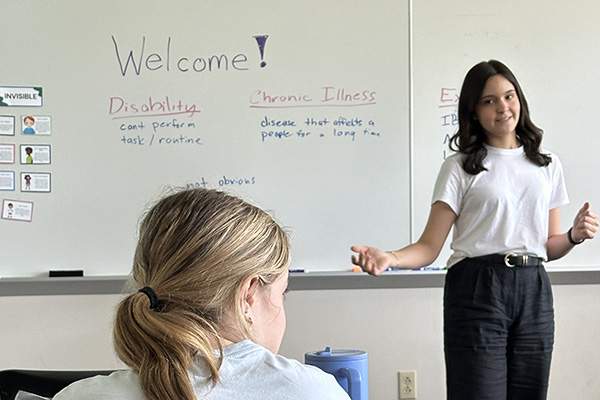
Future Educator Brings Life Lesson to Classroom
Inspired by her illness, Kendall Hirte created a teaching tool to support others and is now pursuing education thanks to STLCC.
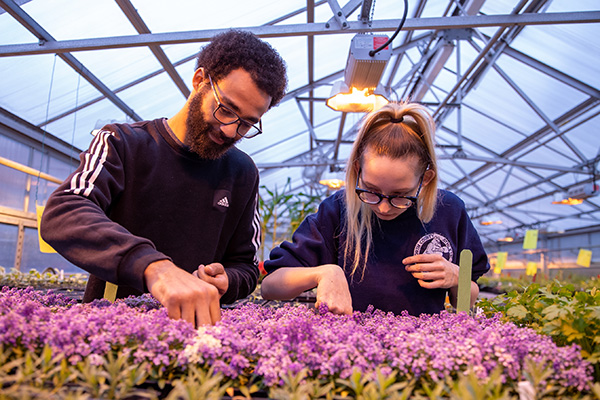
How STLCC’s Horticulture Program Plants the Seeds for Success
Discover how STLCC’s associate degree in horticulture can turn your passion for plants into a rewarding career in the thriving green industry.
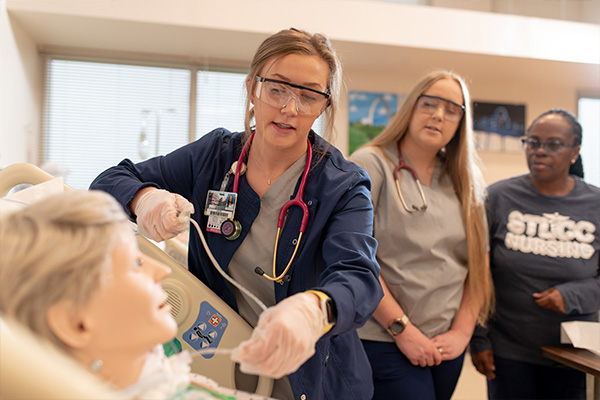
STLCC Prepares You for High-Demand, Well-Paying Health Care Job
STLCC provides an opportunity for students to enter health care professions that need the most workers.
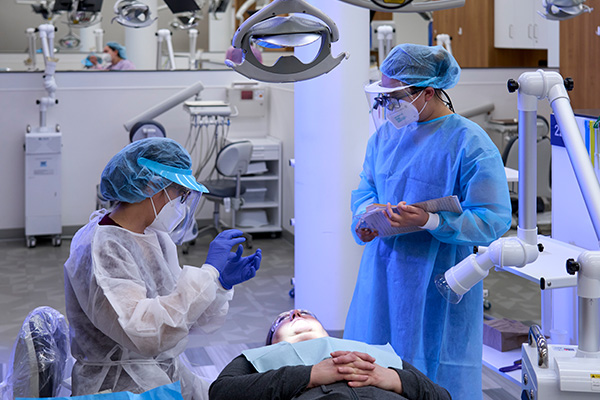
New Health Sciences Degree Great Start to Future
You know you want a health care career—but with so many options, how do you find the right fit?

Cannabis Program at Meramec Leads to High-Growth Careers
A fresh crop of courses has taken root at STLCC-Meramec, as the campus cultivates a groundbreaking program in cannabis education.